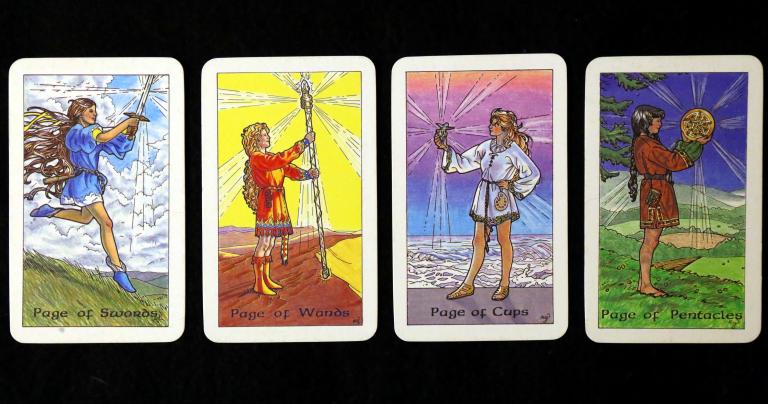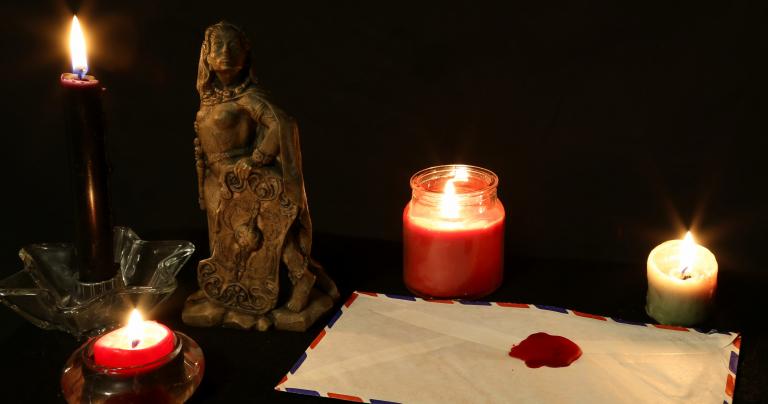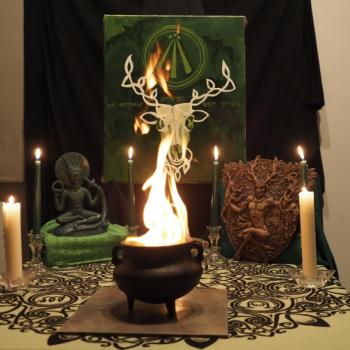Mat Auryn had an excellent blog post last week titled Stop Giving Unsolicited Psychic Guidance. I encourage you to read it for yourself, especially if you’re new to divination and psychic phenomena. Or if you’re not new to it but you haven’t learned this lesson yet.
Mat’s post raises two very different thoughts. The first concerns the ethics of seership. If you’re a seer – in any sense of the term – you have an ethical obligation to your clients similar to that of a medical professional: first, do no harm.
People come to seers because they’re anxious about an uncertain future. We know we can’t tell people “everything will be fine” when we know that’s highly unlikely. But it is just as unethical to give people life-altering messages with certainty. And as Mat explains, it is improper to give people any advice they don’t want and haven’t asked for.
But what happens when it’s not a psychic premonition or a Tarot reading with The Tower, The Devil, and Death showing up in sequence (the odds of that happening in any order are 1 in 76,000), but a message from a deity? “You, Druid – go tell that person I said this!”
If you don’t believe in real Gods you may not see the difference in these two situations. If you haven’t had a God in your head who won’t be quiet until you do what They want you to do, you may not appreciate the urgency of the matter. If so, what I have to say isn’t for you.
But if you understand what I’m talking about – even if you’ve never experienced it yourself – keep reading. This is the work of an oracle – a mouthpiece of the Gods.
What does a God need with a human messenger?
If you’re not familiar with this, you may be asking “why don’t They just tell the person Themselves?”
Who says They haven’t?
In most cases where I’ve delivered a message from a God to a human, the response I got was “yeah, I know.”
Sometimes this is skepticism. Just because you’re an ecstatic polytheist doesn’t mean you’re able to instantly differentiate divine messages from background chatter or from your own thoughts – particularly if it’s something you don’t want to hear. People need external confirmation.
Other times they’re well aware of Who it’s from, but they tell themselves it’s not all that important. Having someone show up on their doorstep tends to increase their sense of urgency.
And then there are some people who simply cannot or will not hear something that isn’t audibly loud and physically imposing.
Regardless of why, the Gods do at least occasionally employ humans to serve as oracles and deliver messages for Them. And that brings us to the main question of this post: what do you do when you have to give someone a message from a God?
Verify the source
First, do everything you can to make sure that who you’re hearing really is who you think it is. Gods are always virtuous, but the Fair Folk will spin the truth to their advantage, and other spirits can and will lie.
After all these years I recognize the voice of the Morrigan. Cerridwen? Not so much. Ask yourself if what you’re hearing is in alignment with what’s known about the deity, both in ancient times and today. Does it reflect Their virtues and values? Are there signs and omens that give you a clue?
I’ve never been asked to deliver a message from a deity I wasn’t already very familiar with. The only people I know who get these kind of “cold call” assignments are so sensitive they can’t not hear them. If that’s you, you don’t need my advice (but I could probably use yours).
Seriously, if a spirit who says they’re a God asks you to deliver a message and you aren’t 99% sure who it is, be very, very skeptical.
Check your own biases
Any experience of or communication with a deity is necessarily filtered through your body and brain. You experience it through your senses. You process it with your brain. You use your knowledge as context to interpret it.
Every time I’ve been told to give a message to someone I’ve verified it with divination. That divination has never said “this is all wrong” but it has caused me to realize I wasn’t hearing with perfect precision and I needed to change some of my words.
Be extremely careful if you have an opinion on the matter at hand.
I was once told to deliver a specific message to someone who was involved in a controversy (the details are beyond oathbound – don’t ask and don’t speculate). But the message was very limited – not at all what I thought needed to be said. The Gods aren’t big on explaining Themselves, but I was told this:
“Yes, I know bad things have been done by My people. Yes, I will handle it. No, there will be no public flogging. Do your job and leave the rest to Me.”
I delivered the message I was given. I still don’t know how the situation worked out, and I may never know. And that’s OK.
Never think this makes you “chosen”
The Gods don’t pick one spokesperson. Or at least, I’ve seen zero evidence that any of Them ever have. The Morrigan is calling a ton of people. Brighid is quietly collecting a rather impressive group of priests and other devotees. I have no connections with the Norse deities, but my Heathen friends tell me Odin and others are busy as well. Whoever is calling you, They’re calling lots of other people too.
I find that exciting and reassuring. But it also reminds me I’m one soldier in the army, not a general and certainly not the Commander in Chief. And while I’m occasionally drafted to put my bardic skills to work in Their service (mainly here on this blog), I speak for Them only on those rare and limited occasions when one of Them says “tell that person I said this.” Everything else I say and write is my own work and should be evaluated accordingly.
Being selected for this service doesn’t make you chosen or favored or anything of the sort. It makes you a page or a bicycle courier. Those are honorable roles that perform good and necessary work. But don’t let it go to your head.

Deliver the message as precisely as you can
This can be hard, particularly if the message you receive comes to you in images or concepts rather than in words. Or if it comes in a language you don’t speak (I’ve never had one of those, but I know others who have).
Be as literal as you can. “The Morrigan said X, Y, and Z.” Full stop. Why She said it, what it means, and how the recipient should respond are not your concern. If the recipient asks for your opinion you can give it (though you’re not obligated to interpret it for them), but make sure to clearly differentiate between “this is what I heard” and “this is what I think it means.”
This isn’t like a Tarot reading where you’re trying to help a person see something they can’t see or don’t want to see. The role of an oracle is different from the role of a seer or a diviner. Your job is to transmit, not to interpret – and certainly not to tell a story.
Transmit the message as faithfully as you can.
Deliver, then disengage
An oracle is a messenger, not a coach or a therapist or even a reader. You have a very limited role: deliver a message. What the recipient does with it is between them and the God who sent it.
What you have to tell them may be hard to accept. It may be deeply personal. It may be embarrassing. Say what you were told to say and then leave them alone. You’re a bicycle messenger – you’re not entitled to hear their whole story. It’s not your job to follow up in a week or two to see how things are going.
If they ask for help you can of course do as you think best. But doing what you think best may very well mean saying “I’m just the messenger – the rest is up to you.”
Do not wish for this work
I love it when a God allows me to serve as Their priest and present Them in a ritual. I am honored when They ask me to write for Them. I am humbled when I’m able to embody Their virtues in the wider world.
But when They give me a message to deliver I’m just scared.
So far no one has shot the messenger, but that expression exists for a very real reason. I worry about how the message will be received. Are they going to believe me? Am I going to lose a friend?
I worry that I won’t get it exactly right, that my own thoughts and feelings will color the message and render it less accurate and thus less useful than it otherwise would be. I worry that the deity who originated it will be disappointed or angry with me.
But part of working with Gods is trusting that They know what They’re doing – that Their wisdom and experience is greater than ours. And so I trust that if the Morrigan or Cernunnos or someone else gives me a message to deliver, They are confident I can do it. And it needs to be done.
And so I deliver it.
But I am thankful this work does not come often.



















